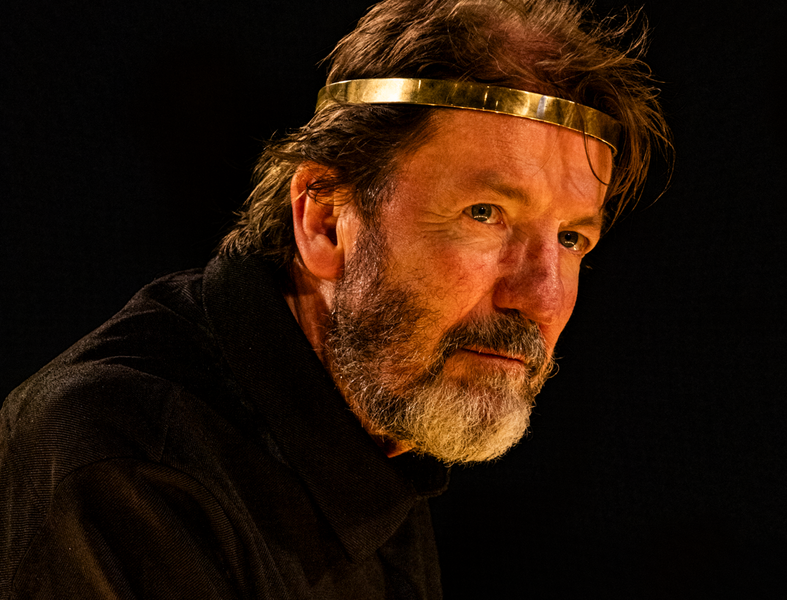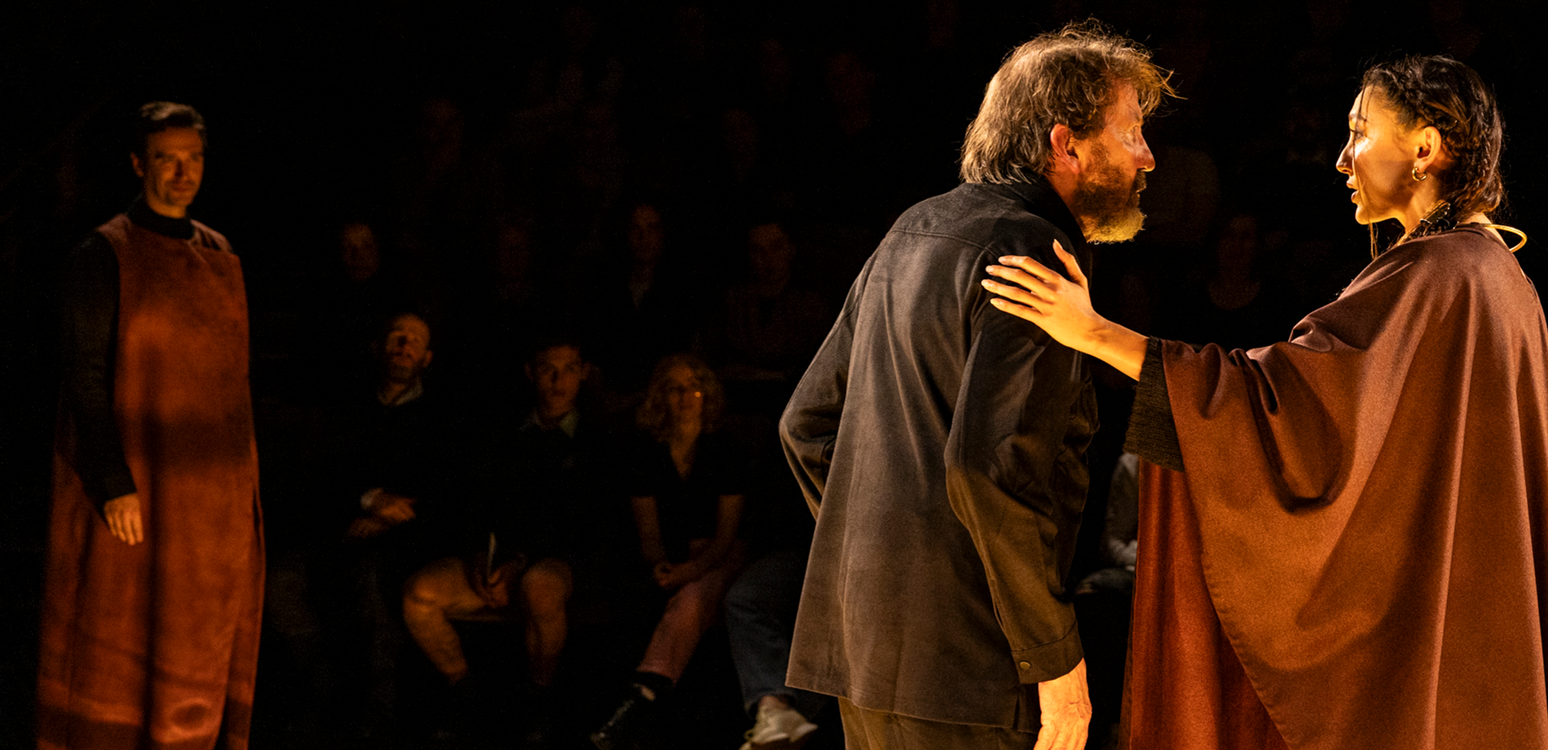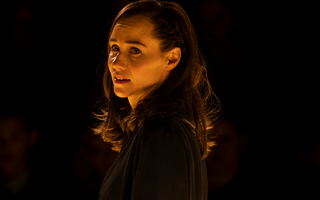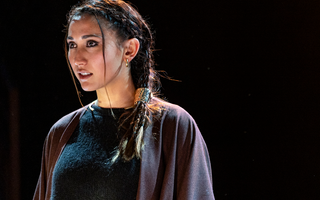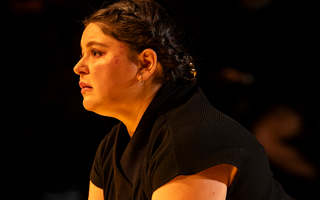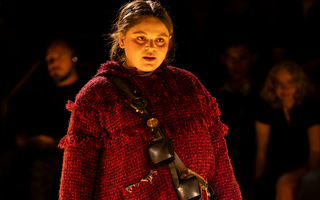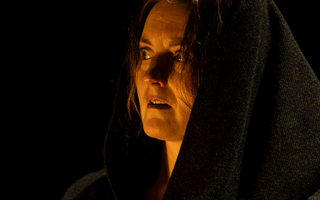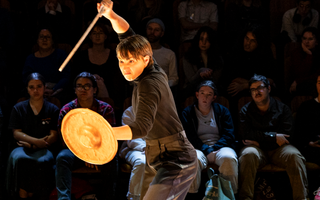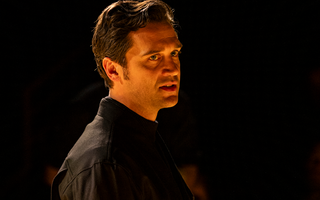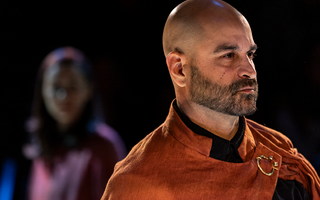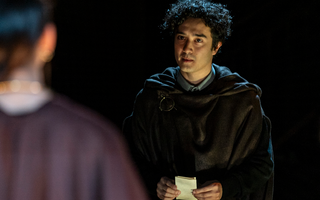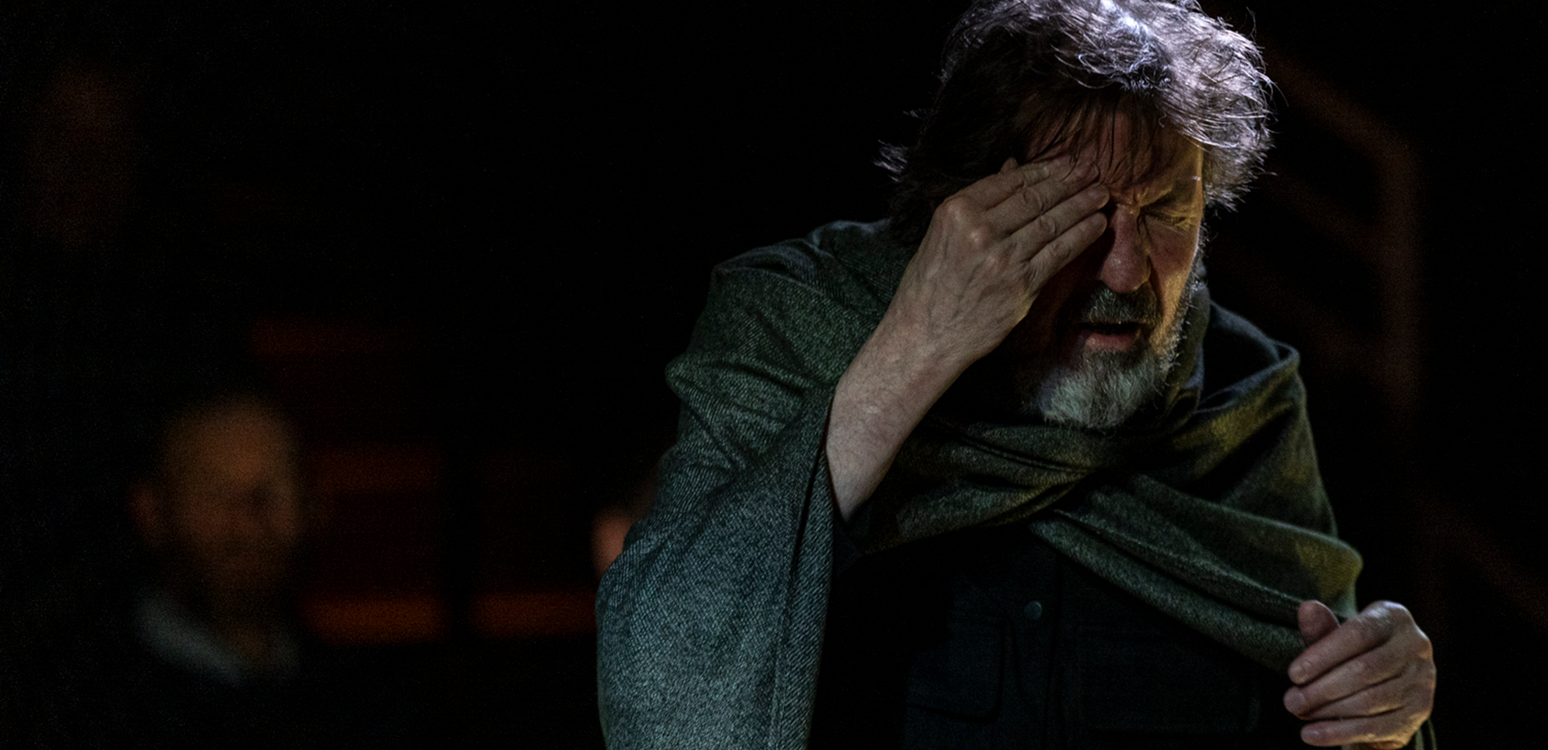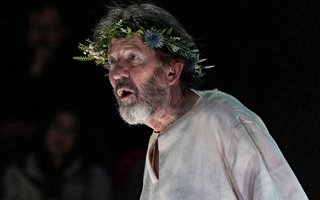
Thou shouldst not have been old till thou hadst been wise.
Act 1, Scene 5
King Lear has ruled his country for a lifetime and decides to surrender his crown.
His plans for succession are such that he will divide his kingdom between his three daughters – Goneril, Regan and Cordelia. Before he does, he challenges them to proclaim their love for him and says their inheritance will be decided according to their responses. While Goneril and Regan make exaggerated proclamations of devotion, Cordelia, Lear’s youngest daughter, says she loves him no more nor less than she should. Lear rashly and angrily disowns her, banishing Cordelia and leaving his empire to her sisters.
Goneril and Regan soon become inhospitable and begin to treat their father with indignity and coldness. Lear, feeling betrayed and grief-stricken, descends into madness and flees with his Fool into a brewing storm. Meanwhile, power games are playing out among the nobility. Edmund, the illegitimate son of the Duke of Gloucester, plans to overthrow his legitimate half-brother, Edgar. He tricks Gloucester into believing that Edgar plans to murder him, forcing Edgar to flee.
Written between 1605 and 1606, King Lear is one of Shakespeare’s great tragedies and the title role is considered one of the greatest acting challenges in the canon. Based on the legend of the ancient British King Leir, Shakespeare’s tragedy delves deeply into the human condition, offering a profound reflection on power, mortality, family and betrayal.
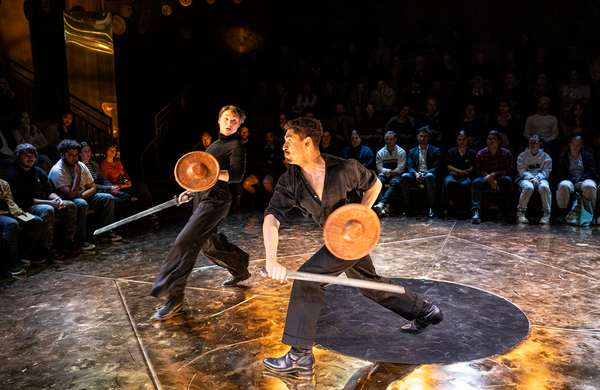
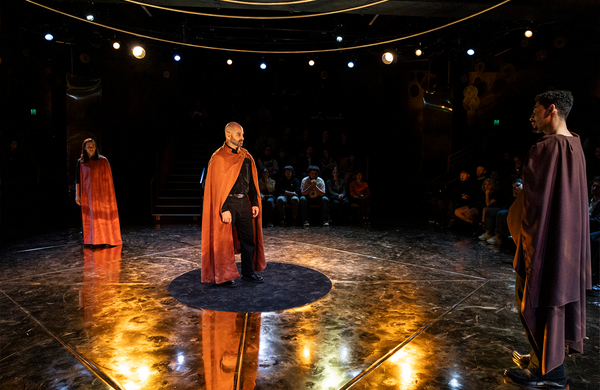
SYNOPSIS
Know that we have divided in three our kingdom…
Act 1, Scene 1
The ageing King Lear announces that he is going to divide his kingdom between his three daughters. He asks which of them loves him the most and says their inheritance will be decided according to their responses. Goneril and Regan, the two eldest, make exaggerated declarations of love, and Lear gives them each a third of his kingdom. He then turns to Cordelia, the youngest, whose answer is concise: “Nothing, my Lord.” (Act 1, Scene 1). Cordelia says she loves her father no more nor less than she should, and that when she marries, her husband will share half that love. Lear, enraged, disowns and banishes her, dividing her share of the kingdom between Goneril and Regan. The Earl of Kent defends Cordelia and is banished as well. The King of France, praising Cordelia’s virtues, takes her as his bride. Goneril and Regan discuss their father’s unpredictable behaviour and resolve to unite in protecting themselves.
Edmund, the illegitimate son of the Duke of Gloucester, plans to overthrow his legitimate half-brother, Edgar. He has forged a letter in his brother’s handwriting that threatens Gloucester’s life. Gloucester reads the letter and tells Edmund to apprehend his brother. Edmund warns Edgar that his father is angry with him, pretending he doesn’t know why. He instructs Edgar to hide.
Goneril complains to her steward Oswald of the unruly behaviour of Lear and his knights. She tells Oswald to treat Lear with negligence and says she will not speak to him.
Lear employs the banished Kent, now disguised as a serving man called Caius, in his service. Goneril enters at Lear’s insistence and complains that Lear and his men are disorderly and riotous. She asks him to dispose of some of his followers. Infuriated, Lear decides to move to Regan’s castle, believing she will give him a better welcome. Conversing with his Fool, Lear exclaims “O let me not be mad, not mad, sweet heaven!” (Act 1, Scene 5).
Fortune, that arrant whore, Ne’er turns the key to the poor.
Act 2, Scene 4
Edmund convinces Edgar to flee. He pretends to fight with Edgar and wounds himself to gain his father’s sympathy. Gloucester, believing Edmund’s lies, vows to bring Edgar to justice and names Edmund his heir. Regan and her husband Cornwall arrive and are also quick to believe Edmund.
Kent/Caius and Oswald enter with messages for Regan. Kent picks a fight with Oswald and begins to beat him. As punishment, Regan and Cornwall place Kent in the stocks. Gloucester warns against this punishment, saying it will offend Lear.
Edgar, hiding from his pursuers, says he will mask his identity by rubbing dirt on his face, wearing a loincloth, tying knots in his hair, and adopting the name 'Poor Tom.'
Lear arrives to visit Regan and is shocked to find his messenger Kent in the stocks. He insists on speaking to Regan and Cornwall. As Lear complains of Goneril’s behaviour to Regan, Regan takes her sister’s side, saying Goneril is blameless. Regan tells Lear to return to Goneril, and to dismiss half his men. Goneril arrives and supports Regan. Lear, overwhelmed with grief and anger, exits amidst a brewing storm. Gloucester entreats Regan and Goneril to send men after Lear, but they refuse and instead lock their doors against the storm.
This cold night will turn us all to fools and madmen.
Act 3, Scene 4
Kent/Caius is seeking Lear in the storm. Lear, who has fled with his Fool, expresses his despair in words that match the violence of the weather: “Blow, winds, and crack your cheeks! Rage, blow / You cataracts and hurricanoes…” (Act 3, Scene 2). Kent enters and entreats Lear to take shelter in a nearby hovel.
Gloucester tells Edmund that the French army has arrived in Britain, seeking revenge for Lear’s treatment. Gloucester wants to find Lear and help him. Edmund, spying a chance to raise his status further, decides to share this information with Cornwall.
Kent is trying to convince Lear to take shelter in the hovel, when Edgar (disguised as Poor Tom) suddenly appears from inside it. Inspired by Edgar’s near-nakedness, Lear begins to remove his own clothes. Gloucester arrives and persuades the group to follow him to another shelter.
Edmund has told Cornwall of Gloucester’s collusion with France. For his loyalty, Cornwall gives Edmund his father’s title.
Lear and his companions have finally found shelter. Gloucester leaves to seek supplies. While he is gone, Lear, the Fool, and Edgar conduct a mock trial of Regan and Goneril, before Lear falls asleep, exhausted. Gloucester returns, having heard of a plot to kill Lear. The group prepares to flee to Dover.
Cornwall learns that Lear has fled with Gloucester’s help. Gloucester is brought in, and Cornwall has him bound to a chair, before questioning him about Lear’s whereabouts and eventually gauging out one of his eyes. A servant tries to intervene and wounds Cornwall before being killed by Regan. Cornwall gouges out Gloucester’s other eye. Regan reveals to Gloucester that Edmund betrayed him, and Gloucester realises Edgar is innocent. Regan and Cornwall throw the blind old man out of the castle.
O ruined piece of nature, this great world / Shall so wear out to naught.
Act 4, Scene 6
The now-blind and despairing Gloucester meets his son Edgar, still disguised as Poor Tom. He asks Edgar to guide him to a cliff in Dover.
Goneril sends Edmund to assist Cornwall in preparing for battle against the French, kissing him before he leaves. Her husband Albany enters, and he and Goneril express mutual disgust and loathing for each other. A messenger enters and announces that Cornwall has died from the injuries he sustained while torturing Gloucester.
The King of France has suddenly returned home, leaving a Marshal behind to lead the battle against Britain. Cordelia has been informed of her father’s misfortunes and is grief-stricken. She sends a gentleman to seek Lear.
Regan learns that Albany’s forces are preparing to fight the French. Regan suspects that Goneril and Edmund are having an affair. She tells Oswald she has the greater claim on Edmund because she is now a widow. She sends Edmund a note via Oswald, and also tells Oswald that he will be rewarded if he can kill Gloucester.
Edgar pretends to lead Gloucester to the edge of a cliff, but it is in fact a flat piece of land. Gloucester throws himself forward, falling to the floor and losing consciousness. When he wakes, Edgar tells Gloucester that he has miraculously survived his fall from the ‘cliff’. Gloucester resolves to be more accepting of his circumstances.
Lear enters, raving in madness, but runs away again when Cordelia’s gentleman arrives. Oswald enters, determined to kill Gloucester. Edgar instead kills Oswald and removes a letter from his body. In the letter, Goneril asks Edmund to kill her husband Albany so that they can be married.
In a tent near the French camp, a sleeping Lear is brought to Cordelia. He awakens, his senses begin to return, and he and Cordelia are joyfully reunited.
When thou dost ask me blessing I’ll kneel down / And ask of thee forgiveness.
Act 5, Scene 3
When questioned by Regan, Edmund denies his affair with Goneril. Goneril and Albany enter, ready to defend Britain against the French. Edgar/Poor Tom enters and privately gives Albany the letter he removed from Oswald’s body. Before Albany can read it, Edmund announces that the French forces are drawing near. Edmund, alone on stage, reveals that he has sworn his love to both Goneril and Regan, and is not sure which one to choose.
Cordelia, Lear, and their army move toward battle. Edgar enters with Gloucester and seats him under a tree. Edgar leaves but quickly returns and reports that Lear has lost the battle, and he and Cordelia have been taken captive.
Lear and Cordelia are led in as prisoners. Lear speaks affectionately to his daughter, saying that they will be happy together in prison. As Lear and Cordelia are led away, Edmund hands a captain their death warrant.
Albany, Goneril and Regan enter. Albany demands that the two prisoners be handed over to him, and arrests Edmund and Goneril for capital treason. Regan begins to feel unwell and is led off. Edgar/Poor Tom enters and declares Edmund a traitor. The brothers fight and Edmund falls. Albany reveals the traitorous letter from Goneril to Edmund. Goneril flees. Edmund admits to the charges. Edgar reveals his identity and the fact that Gloucester has died. A gentleman announces that Goneril has killed herself, and that Regan, who had been poisoned by Goneril, is dead. Lear enters holding Cordelia, who has just been hanged. A messenger enters and says Edmund has died. Moments later, Lear dies. Edgar is left to assume the role of King.
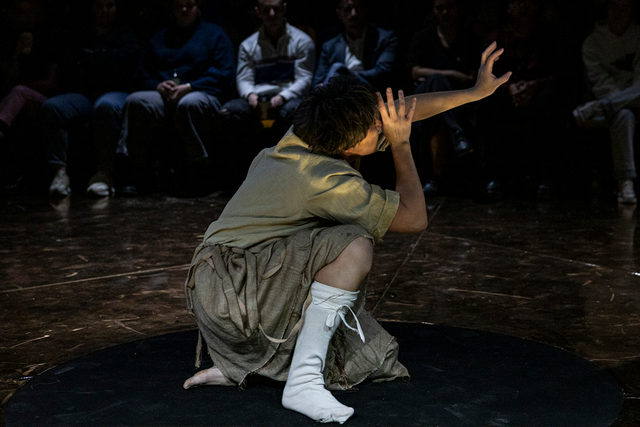
Fast facts
King Lear features more references to nature and animals than any other play in Shakespeare’s canon.
Themes
Discover the key themes explored in King Lear, with examples from the play.
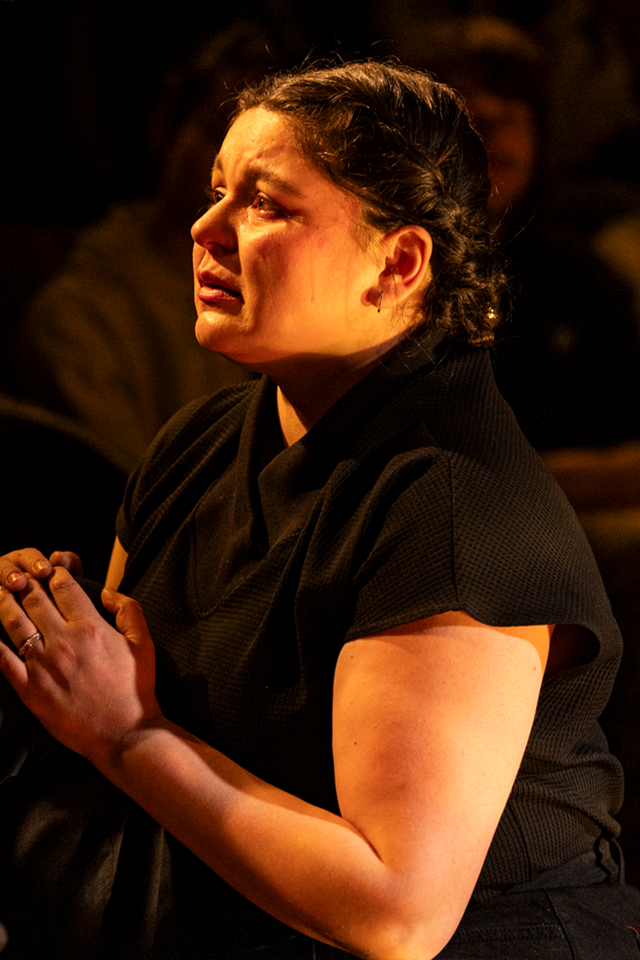
Debatable points
Is Cordelia justified in refusing to flatter her father?
Her direct and honest response provokes her father’s fury and leads to her banishment, but she refuses to back down from it.
Imagery
Discover how Shakespeare uses vivid visual imagery in King Lear.
